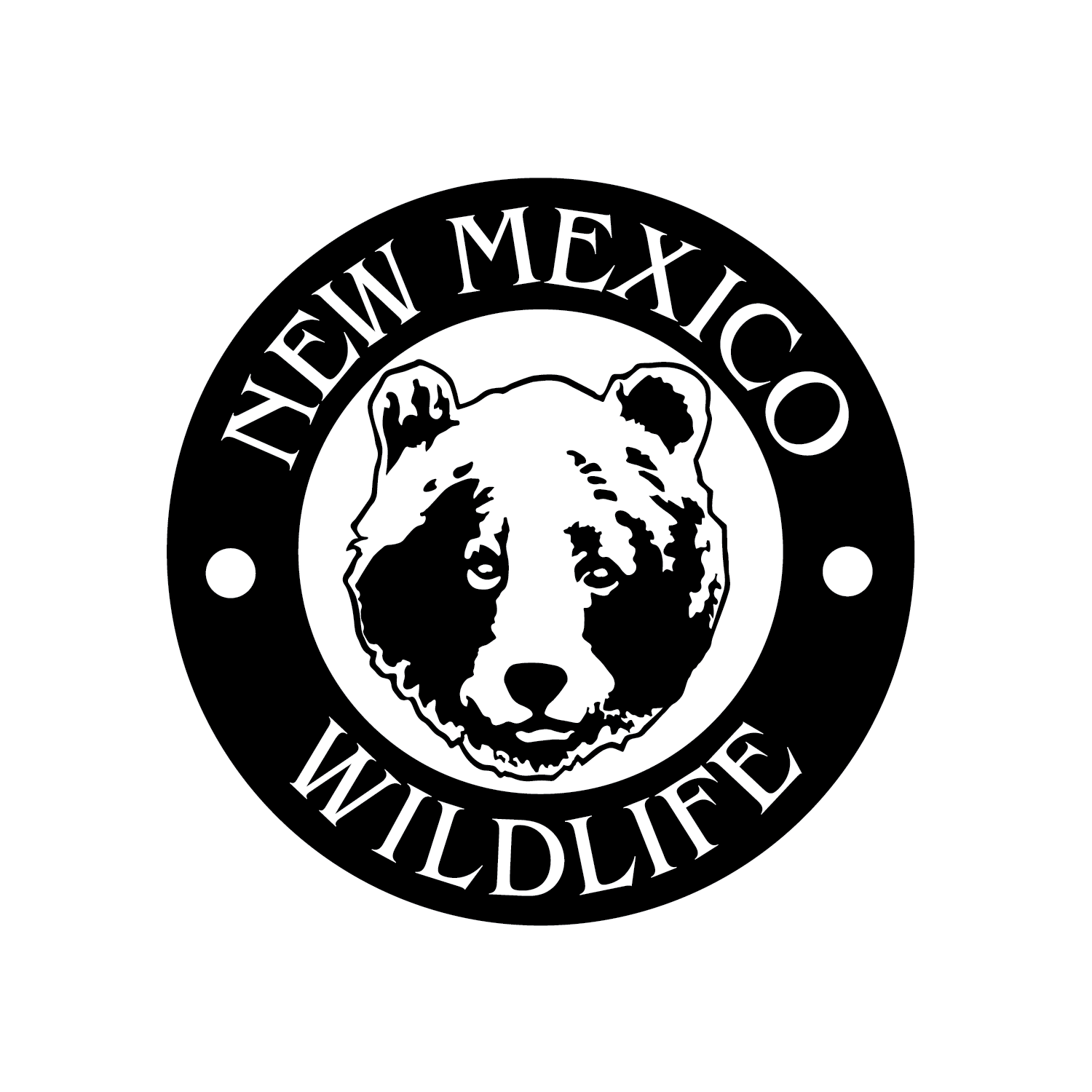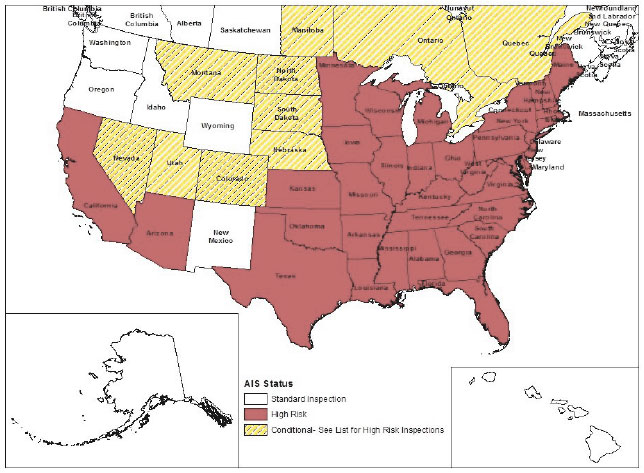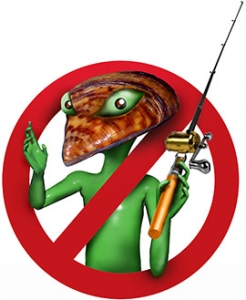Aquatic Invasive Species (AIS)
Click the tab headings below to learn more about Aquatic Invasive Species.
Boating Rules
New Mexico Department of Game and Fish has adopted new rules to combat the spread of zebra mussels, quagga mussels and other AIS.
- Mandatory watercraft inspection and, if necessary, decontamination of out-of-state registered watercraft or watercraft re-entering New Mexico
- Mandatory watercraft inspection required any time an inspection station is set up and in operation
- Fourteen (14) day advanced notification of intent to transport watercraft 26 ft. or longer into New Mexico
- All watercraft are required to “pull the plug” and drain watercraft when transporting in New Mexico
- Implementation of a voluntary watercraft seal program to expedite boater access to a waterbody with limited need for inspection
[wpfilebase tag=file id=2749 tpl=filebrowser /]

Inspection Stations
Click to reload map below if borders or tools are missing, or view mobile map in a new browser window.
Click to reload map above if borders or tools are missing, or view mobile map in a new browser window.E-mail Newsletter
Sign up for our AIS newsletter, e-mailed 3-4 times a year, to receive the latest info regarding Aquatic Invasive Species:
- Current zebra and quagga mussel positive waters
- Current NMDGF watercraft inspection locations
- Tips for getting your watercraft Clean, Drain and Dry
- Technology news and more…
Enter your email below and hit the submit button. On the page of Subscription Topics check the box beside Aquatic Invasive Species (AIS).
More AIS Information
List of Infested Water Bodies in the U.S.
Invasive Species Control Act Press Release
AIS Links
Texas Invasive: Hello Zebra Mussels. Goodbye Texas Lakes.
Western Regional Panel on Aquatic Nuisance Species
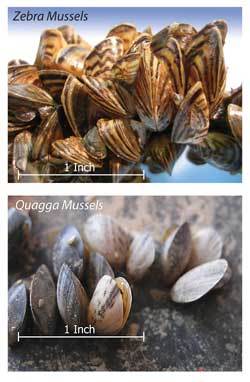 An Aquatic Invasive Species (AIS) is any non-native plant, animal, or pathogen that can harm our economy, environment and human, animal, or plant health. The New Mexico Department of Game and Fish, along with state, federal and private partners, are working diligently to stop the spread of Aquatic Invasive Species.
An Aquatic Invasive Species (AIS) is any non-native plant, animal, or pathogen that can harm our economy, environment and human, animal, or plant health. The New Mexico Department of Game and Fish, along with state, federal and private partners, are working diligently to stop the spread of Aquatic Invasive Species.
Of particular concern is invasion of our lakes and water by zebra and quagga mussels. Spread of these mussels not only pose a risk to our native aquatic wildlife, but also to all water-based recreation including boating and fishing, as well as to all surface water delivery systems including municipal water supplies, hydroelectric power generation and irrigation for farming and agriculture.
Currently, there is no known method for successful irradiation of these mussels, creating enormous management costs which will be passed along to New Mexicans. In a water-dry state such as ours, infestations by zebra or quagga mussels will affect everyone! This is why in New Mexico it is unlawful to knowingly transport AIS into and within New Mexico’s borders.
The New Mexico Department of Game and Fish, along with New Mexico State Parks, the US Fish and Wildlife Service, the US Army Cops of Engineers, the US Bureau of Reclamation, along with other stakeholders are asking boaters to CLEAN, DRAIN and DRY their boats to stop the spread of harmful invasive mussels. Properly cleaning and drying your boat will also help keep it in good condition and allow all of us to continue to enjoy our favorite lakes for years to come. Boaters should be prepared for inspections throughout the state designed to help ensure that New Mexico’s waters remain mussel-free!

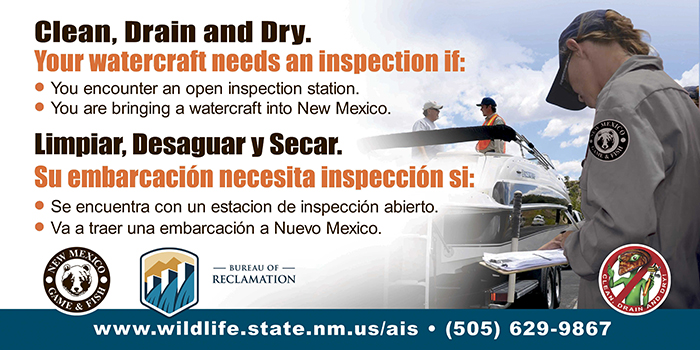

AIS Youtube Videos
See also:
New Mexico’s Army Corps of Engineers takes on Mussels
Don’t let it loose!
Don’t let it loose!
Releasing a pet to the wild is never the right thing.
What is the problem?
If released, most pets don’t survive and many suffer before they die. Pets are usually unable to find food or shelter in the wild and they are often an easy meal for another creature. If it survives, your pet becomes an inva- sive species that causes harm to the environment and economy.
Instead of Releasing
- Contact a local pet store – they may be able to help
- Give/trade with another aquarist, pond owner, or water gardener
- If you have a dog, cat or other small mammal check with the Humane Society or local animal shelter
- Seal aquatic plants in plastic bags and dispose in the trash
- Contact a veterinarian or pet retailer for humane disposal guidance
Contact
|
